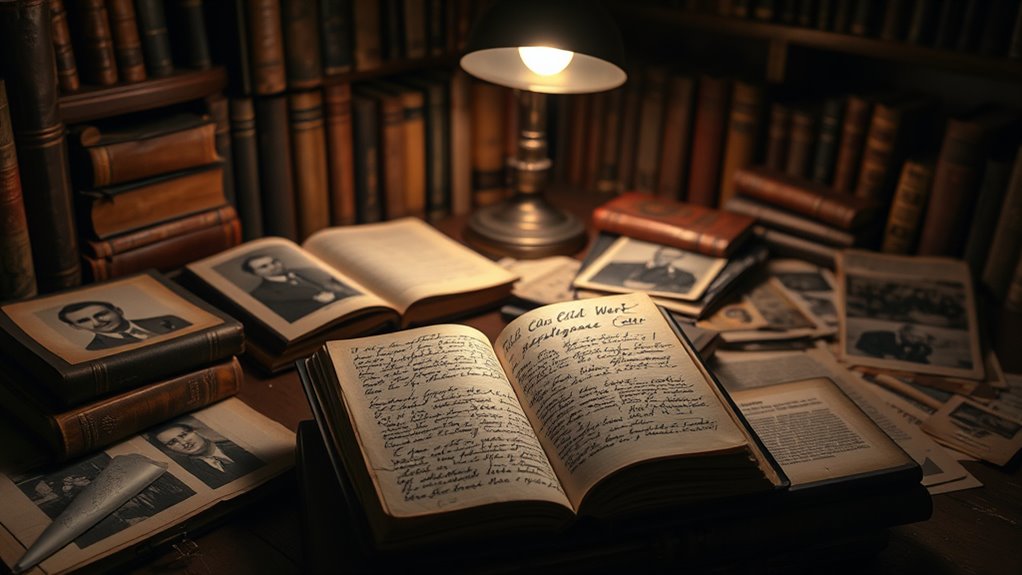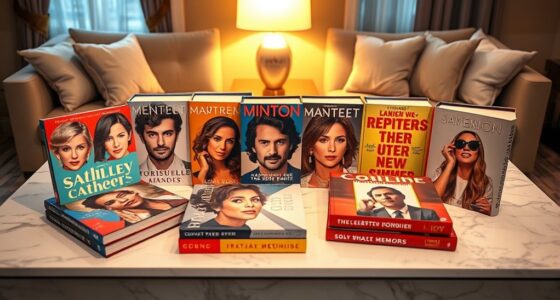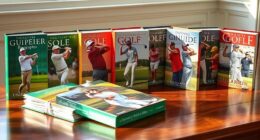If you’re seeking the best Cold War biographies full of fascinating insights and untold stories, I recommend titles like *The Spy and the Traitor*, which reveals espionage close calls and betrayals, and *Witness*, offering a personal look at moral transformation amid Cold War tensions. Other compelling options include biographies of strategic leaders, military pioneers, and diplomatic insiders that highlight leadership, innovation, and complex legacies. Continue exploring these works to uncover the hidden facets of Cold War history and its enduring impact.
Key Takeaways
- The list includes biographies like *Witness* and *The Spy and the Traitor* that reveal personal transformations and behind-the-scenes espionage stories.
- It features works on Cold War leaders and agents, offering insights into moral dilemmas, leadership, and covert operations.
- Biographies such as *A Fiery Peace in a Cold War* highlight technological innovations and strategic decisions shaping the era.
- The selection covers untold stories of women at the CIA, military heroes, and key policymakers, providing diverse perspectives.
- Many books combine detailed research with personal narratives to uncover lesser-known facts and the complex legacy of Cold War interventions.
The Spy and the Traitor: The Greatest Espionage Story of the Cold War

If you’re passionate about detailed, well-researched Cold War espionage stories, “The Spy and the Traitor” is a must-read. I was captivated by Ben Macintyre’s skillful storytelling, blending historical facts, interviews, and archives into a gripping narrative. It’s a page-turner that feels like a novel, yet remains meticulously accurate. The book dives deep into the lives of spies like Oleg Gordievsky, Kim Philby, Aldrich Ames, and Robert Hanssen, revealing how close we came to nuclear catastrophe. I found myself emotionally invested in their sacrifices and betrayals, making this one of the most compelling true spy stories of the Cold War era.
Best For: readers who are passionate about Cold War history, espionage stories, and well-researched narratives that combine factual accuracy with engaging storytelling.
Pros:
- Highly detailed and meticulously researched, providing an authentic account of Cold War espionage
- Engaging writing style that makes complex spy stories accessible and captivating
- Excellent character portrayals, especially of heroes like Oleg Gordievsky and traitors like Aldrich Ames
Cons:
- Contains brief adult themes such as mentions of torture, betrayal, and pornography which may not be suitable for sensitive readers
- Some readers might find the depth of detail overwhelming if they prefer lighter summaries
- Focused primarily on Cold War espionage, which might not appeal to those interested in other historical periods or topics
Witness

Witness stands out as a must-read biography for anyone interested in the inner workings of Cold War espionage and the moral courage required to confront ideological deception. I was struck by Chambers’ transformation from a Communist sympathizer to a devout Christian and fierce anti-Communist. His detailed account of espionage within the U.S. government reveals the depth of Soviet infiltration, especially through figures like Alger Hiss. Chambers’ storytelling is powerful, blending personal struggle with political revelations. His unwavering moral stance and literary mastery make “Witness” a compelling window into a dangerous, secretive world—and a testament to the importance of integrity in the face of ideological darkness.
Best For: readers interested in Cold War history, espionage, moral courage, and the ideological battles of the 20th century.
Pros:
- Offers a detailed, firsthand account of Soviet infiltration and espionage within the U.S. government.
- Showcases Chambers’ powerful storytelling and literary mastery, making complex topics accessible and compelling.
- Provides inspiring insights into moral integrity, personal transformation, and the importance of patriotism and truth.
Cons:
- The nearly 700-page length may be daunting for some readers seeking a shorter overview.
- Some readers might find the detailed political and espionage content dense or challenging to follow.
- The book’s heavy focus on Cold War era events may be less engaging for those primarily interested in contemporary issues.
Americas Cold Warrior Book by Paul Nitze
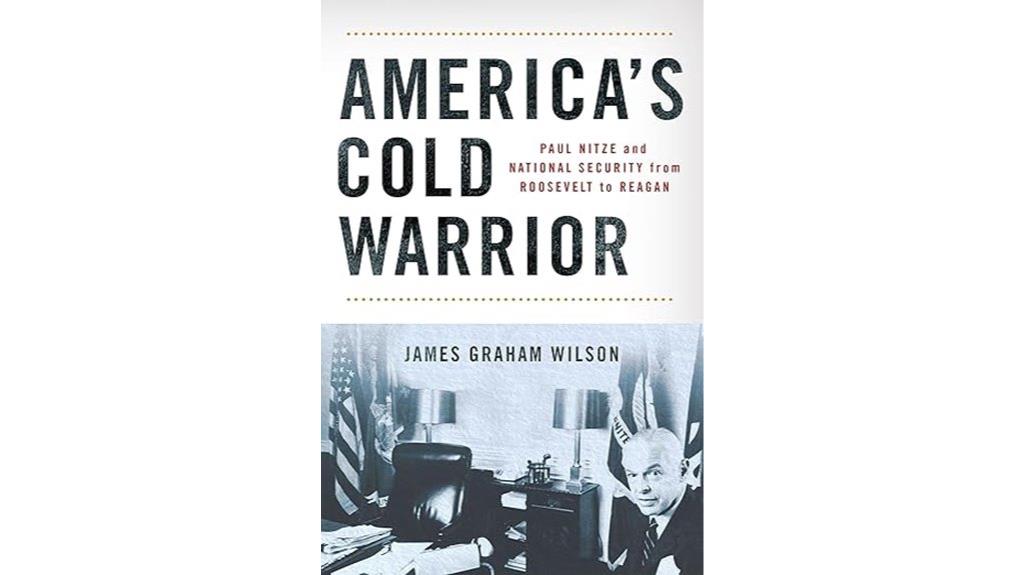
For readers seeking an in-depth understanding of U.S. Cold War strategy, *America’s Cold Warrior* by Paul Nitze is essential. I found it revealing how Nitze shaped American foreign policy for over fifty years, especially with his role in developing NSC-68, which set the tone for containment and deterrence. His pragmatic, action-oriented approach contrasted with peers like Kennan, favoring strength and preparedness over diplomacy alone. The biography offers vivid insights into critical moments—Berlin, Cuba, Eastern Europe—and explains Nitze’s cautious outlook on Soviet reforms. Wilson’s well-researched account highlights Nitze’s lasting influence on strategic doctrine, making this a must-read for anyone interested in Cold War history.
Best For: readers interested in Cold War history, U.S. national security strategy, and the legacy of pragmatic bipartisan leadership in foreign policy.
Pros:
- Provides a detailed, well-researched account of Paul Nitze’s influential career and strategic thinking
- Offers accessible explanations of complex Cold War topics like arms control, deterrence, and diplomatic negotiations
- Emphasizes lessons in pragmatic, bipartisan policymaking applicable to contemporary great power competition
Cons:
- Slightly small font size may affect readability for some readers
- Focuses heavily on historical context, which might be less engaging for casual readers seeking lighter content
- As a biography, it may lack broad thematic analysis for those looking for a general Cold War overview
A Fiery Peace in a Cold War: Bernard Schriever and the Ultimate Weapon
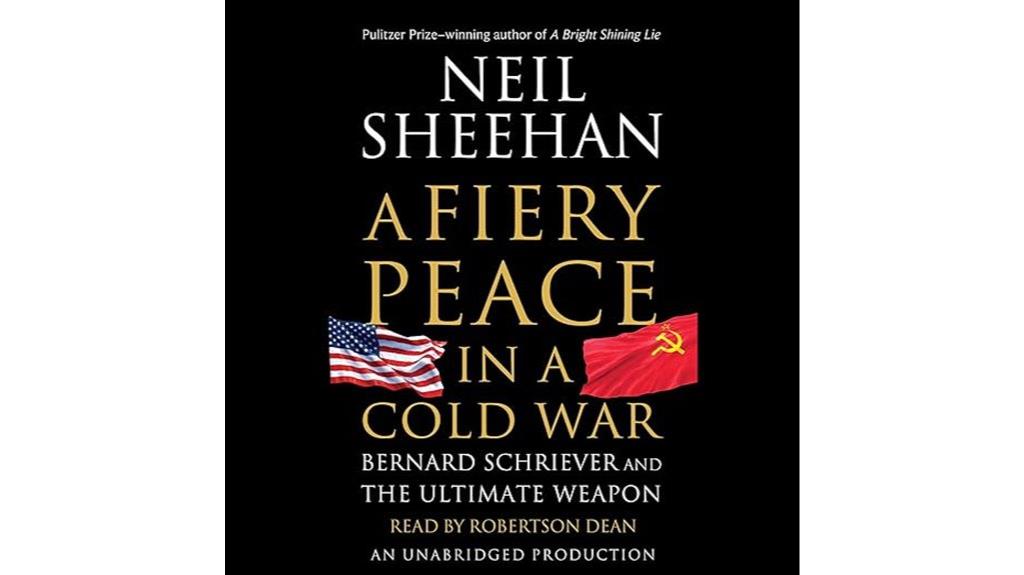
A Fiery Peace in a Cold War: Bernard Schriever and the Ultimate Weapon stands out as a must-read among the 12 Best Cold War Biographies for anyone interested in understanding how strategic innovation shaped modern military power. Schriever’s leadership in developing the U.S. ICBM program transformed Cold War deterrence, shifting the focus from bombers to missile technology. His collaboration with scientists, military officials, and presidents helped secure the future of nuclear deterrence and space exploration. This biography reveals the personal dedication and collective effort behind America’s strategic missile superiority, shaping global security and preventing large-scale conflict during tense Cold War years.
Best For: readers interested in Cold War history, military innovation, and the personal stories of those who shaped nuclear deterrence and space exploration.
Pros:
- Provides a detailed and engaging account of Bernard Schriever’s leadership and technological advancements.
- Highlights the collaboration between scientists, military officials, and policymakers, illustrating the teamwork behind missile development.
- Connects Cold War missile programs to broader themes of deterrence, peacekeeping, and scientific progress.
Cons:
- The dense technical and biographical details may be overwhelming for casual readers.
- Some readers might find the focus on personalities and organizational efforts less engaging than a broader geopolitical analysis.
- The narrative occasionally becomes complex, requiring prior knowledge of missile technology and Cold War history.
From Cold War To Hot Peace: An American Ambassador in Putins Russia
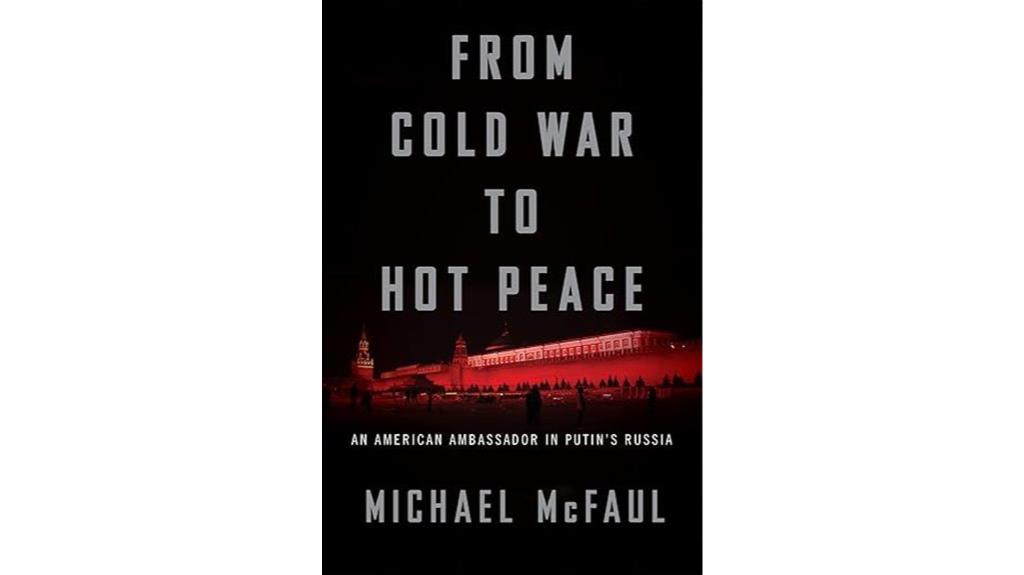
If you’re looking for a detailed and personal account of US-Russian relations during the Putin era, “From Cold War To Hot Peace” offers invaluable insights. McFaul, a former US Ambassador to Russia, shares his firsthand experiences navigating a tense and often hostile environment. He details Putin’s harassment, propaganda, and the ban that cut his diplomatic efforts short, highlighting the personal costs of diplomacy. The book covers key issues like NATO expansion, Crimea, and Ukraine, criticizing US mistakes and emphasizing Putin’s personality as a major factor in deteriorating relations. McFaul’s blend of scholarly analysis and personal storytelling provides a compelling, honest perspective on this complex period.
Best For: readers interested in an insider’s detailed, personal perspective on US-Russian relations during Putin’s era, combining scholarly insights with diplomatic experience.
Pros:
- Provides a comprehensive, firsthand account of diplomatic challenges and personal experiences in Russia.
- Combines scholarly analysis with accessible storytelling, appealing to both lay readers and experts.
- Offers valuable insights into key issues like NATO, Crimea, and Putin’s personality, supported by detailed documentation.
Cons:
- Some cultural misunderstandings or oversimplifications about Russian society and customs.
- Reliance on translations and superficial knowledge of Russian language may limit cultural depth.
- Personal biases and political affiliations could influence the interpretation of events and characters.
Covert Regime Change: Cold War Studies in Security Affairs
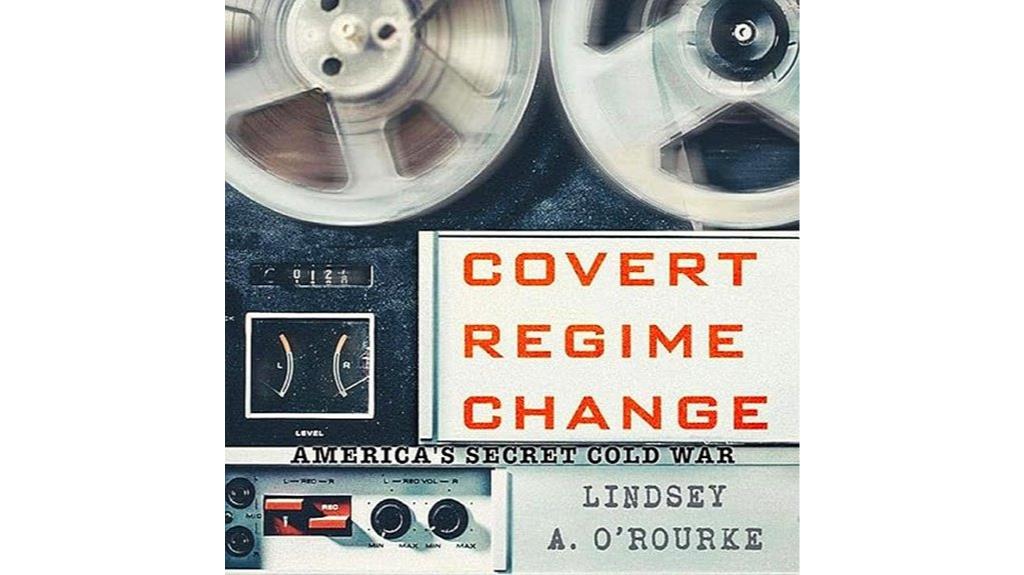
Covert Regime Change: Cold War Studies in Security Affairs offers a compelling exploration for students and scholars interested in understanding the hidden strategies behind US foreign policy during the Cold War. This book meticulously analyzes both overt and covert interventions, revealing how maintaining global dominance drove many operations. It shows that despite efforts, success rates were below 15%, often worsening conditions and causing tragic consequences. Focusing on Cold War CIA activities, it demonstrates that these covert tactics persist today, often disguised as efforts to restore democracy or negotiate behind the scenes. This evidence-based work challenges assumptions about the effectiveness and morality of such interventions, providing crucial insights into security policies.
Best For: students, scholars, and policymakers interested in understanding the hidden strategies and consequences of US covert and overt interventions during the Cold War and beyond.
Pros:
- Provides a meticulously researched, evidence-based analysis of US foreign policy and covert operations.
- Offers deep insights into the mechanics, motivations, and outcomes of regime change efforts over the past half-century.
- Challenges assumptions about the effectiveness and morality of interventions, fostering critical thinking.
Cons:
- The dense academic style may be challenging for casual readers or those new to the subject.
- The complex case studies require prior background knowledge for full comprehension.
- The focus on Cold War-era activities might feel less immediately relevant to contemporary policy without careful contextualization.
The Sisterhood: The Secret History of Women at the CIA

Wondering how women shaped intelligence operations during the Cold War and beyond? *The Sisterhood: The Secret History of Women at the CIA* offers a compelling look into their often-overlooked contributions, making it an essential read for anyone interested in the hidden stories behind Cold War espionage. This well-researched book traces women’s roles from OSS days through the War on Terror, highlighting their intelligence, resilience, and patriotism. It exposes early discrimination, workplace harassment, and barriers women faced, yet showcases their crucial impact—tracking terrorists, uncovering threats, and breaking gender biases. Their perseverance and professionalism reveal a powerful, underappreciated chapter in intelligence history.
Best For: readers interested in espionage history, gender studies, and stories of resilience and perseverance within intelligence agencies.
Pros:
- Provides a detailed, well-researched account of women’s roles at the CIA from OSS to modern times.
- Highlights inspiring personal stories of perseverance and professionalism in a male-dominated field.
- Combines historical facts with first-hand accounts, making it engaging and informative.
Cons:
- The audiobook narration has been criticized for being less engaging and somewhat distracting.
- The author’s political bias becomes more apparent in the epilogue, which may detract from the overall neutrality.
- Some readers may find the detailed history overwhelming or dense if they prefer lighter reads.
The Very Best Men: The Daring Early Years of the CIA

For readers interested in the roots of American intelligence, “The Very Best Men: The Daring Early Years of the CIA” offers a vivid, well-researched look at the agency’s formative decade. Evan Thomas masterfully profiles key figures like Wisner, Barnes, and FitzGerald, revealing their motivations, successes, and flaws. The book highlights how Ivy League-educated men, driven by noble aims, often mishandled covert operations due to inexperience. With engaging storytelling and insights from CIA archives and interviews, it explores the moral ambiguities and chaotic management that defined those early years. This compelling account deepens our understanding of the CIA’s origins and the complex legacy it left behind.
Best For: history enthusiasts and readers interested in the origins and early operations of the CIA who appreciate well-researched, engaging biographies of intelligence figures.
Pros:
- Well-researched and draws from CIA archives and interviews, providing authentic insights.
- Engaging storytelling that keeps readers captivated from start to finish.
- Offers a nuanced understanding of the moral complexities and chaotic management of the early CIA.
Cons:
- Out of print, limiting accessibility for some readers.
- Focuses mainly on prominent figures, possibly overlooking broader organizational dynamics.
- May contain humor and tone that some readers find less serious for scholarly purposes.
The Spy and the Traitor: The Greatest Espionage Story of the Cold War

If you’re captivated by stories of espionage that blend high-stakes intrigue with deep personal sacrifice, *The Spy and the Traitor* stands out as a must-read. Ben Macintyre’s masterful storytelling combines meticulous research, interviews, and archive material to create a gripping narrative that feels like a novel. It details the daring defection of Oleg Gordievsky, the betrayal by spies like Kim Philby and Aldrich Ames, and the intense paranoia within Cold War intelligence agencies. The book vividly portrays the human costs, heroism, and moral dilemmas faced by spies, revealing how close the world came to nuclear catastrophe. It’s an essential read for Cold War enthusiasts.
Best For: readers passionate about Cold War history, espionage stories, and gripping narratives of personal sacrifice and intrigue.
Pros:
- Highly engaging and well written, often compared to a novel in its storytelling.
- Meticulously researched with accurate historical details and insightful analysis.
- Offers a compelling portrayal of espionage craft, personal stories, and moral dilemmas.
Cons:
- Contains brief adult themes such as mentions of torture, betrayal, and pornography.
- Some readers may find the detailed espionage tactics complex or dense.
- The focus on Cold War espionage may not appeal to those seeking lighter or unrelated topics.
The Quiet Americans Book
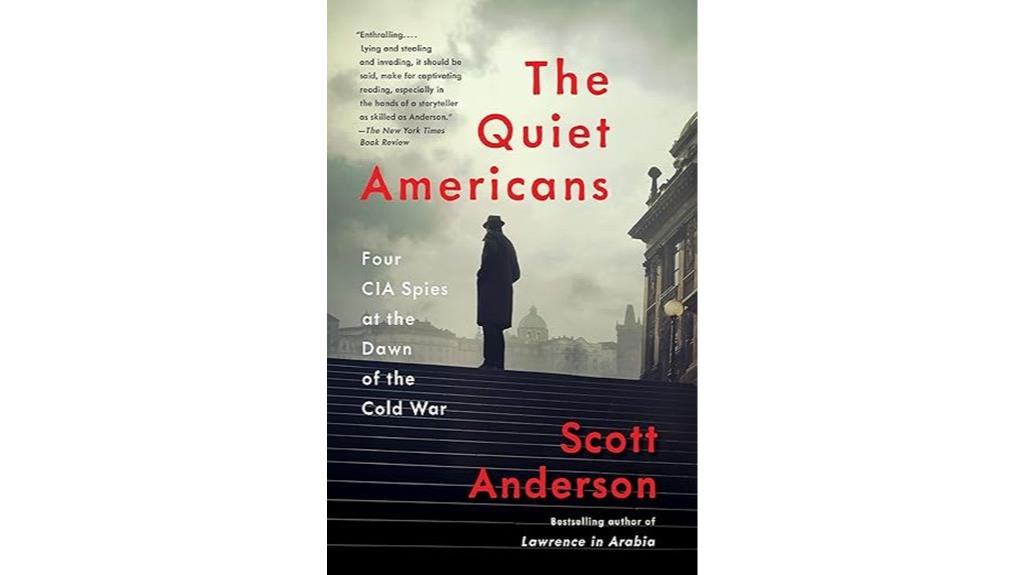
The Quiet Americans stands out as a must-read for those interested in the personal stories behind Cold War espionage and the inner workings of the CIA’s early years. I was captivated by how the book focuses on four key spies, revealing their daring missions, personal sacrifices, and rise to policy influence. It offers a detailed look at the agency’s origins, from WWII OSS roots to Cold War conflicts like Iran, Guatemala, and Vietnam. The narrative exposes internal struggles, bureaucratic politics, and the consequences of American interventions driven by paranoia. This book deepens your understanding of how individual personalities shaped history and the costs of Cold War overreach.
Best For: readers interested in Cold War history, espionage stories, and the personal sacrifices of CIA operatives during the early years of American intelligence.
Pros:
- Provides detailed personal stories that humanize Cold War espionage.
- Offers a comprehensive history of the CIA’s origins and early operations.
- Critically examines the consequences of Cold War interventions and policies.
Cons:
- Focuses heavily on individual biographies, which may not appeal to those seeking broad geopolitical analysis.
- Assumes some prior knowledge of Cold War events, potentially limiting accessibility for newcomers.
- The narrative may evoke a sense of disillusionment with American foreign policy, which could be uncomfortable for some readers.
The Last Castle Book
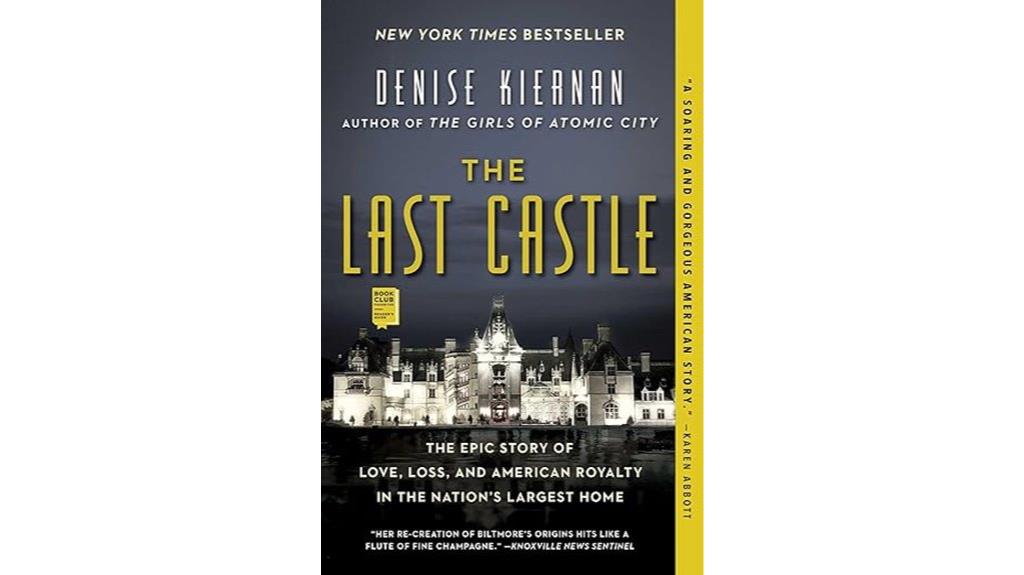
Anyone interested in American history, particularly the Gilded Age and the legacy of the Vanderbilt family, will find The Last Castle to be an invaluable read. This book covers Biltmore Estate, the largest privately owned home in the U.S., built by George Vanderbilt in Asheville, North Carolina. It explores the estate’s grandeur, architecture, and influence on conservation efforts like Pisgah National Forest. The narrative also highlights Vanderbilt’s family, especially Edith Vanderbilt, and her role in shaping Asheville’s cultural scene. While detailed and richly researched, some readers might find its social minutiae tedious. Still, it offers deep insights into Gilded Age wealth, resilience, and the Vanderbilt legacy.
Best For: history enthusiasts, particularly those interested in the Gilded Age, Vanderbilt legacy, and American conservation efforts.
Pros:
- Well-researched and comprehensive in covering Biltmore Estate’s history and family dynamics
- Offers rich contextual insights into American society during the Gilded Age
- Inspires deeper appreciation and understanding before visiting the estate
Cons:
- Photographs lack grandeur and visual impact
- Social details and minutiae can be tedious or filler for casual readers
- Less focused on architectural specifics of the house itself
Crossing Lines: The Edward E. Zobrist Story – An American Soldiers Journey
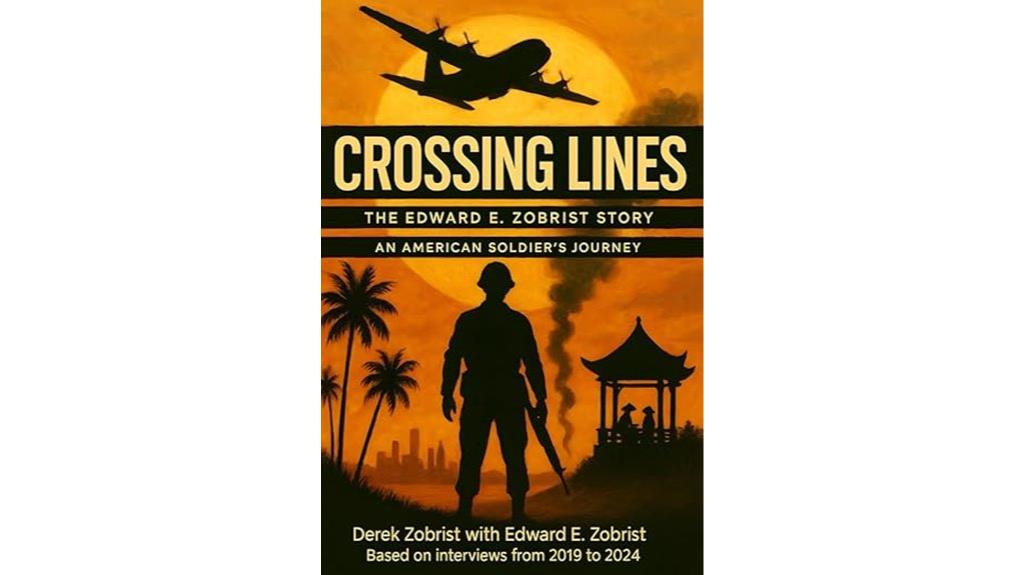
Crossing Lines: The Edward E. Zobrist story takes you inside the life of an American soldier whose journey spans from humble beginnings to military leadership. I was struck by how Edward’s career evolved from enlisting after high school to becoming a Mustang officer, serving in Korea, Vietnam, and beyond. His personal stories—meeting two women in wartime, raising a family amidst chaos—highlight resilience and love. The memoir offers raw insights into combat, leadership, and moral struggles, making him a relatable figure. It’s a powerful reminder that behind every soldier’s uniform lies a human being shaped by sacrifice, growth, and unwavering determination.
Best For: readers interested in authentic military stories, personal growth, and moral reflections that go beyond traditional war narratives.
Pros:
- Offers a deeply personal and relatable portrayal of a soldier’s life and leadership journey.
- Provides detailed insights into historical conflicts like Korea, Vietnam, and post-9/11 Middle Eastern wars.
- Emphasizes themes of resilience, love, sacrifice, and moral integrity, making it emotionally impactful.
Cons:
- May focus heavily on personal stories, potentially less engaging for readers seeking pure military tactics or strategy.
- As a memoir, it might contain subjective perspectives that differ from official historical accounts.
- The depth of personal and cultural detail might be overwhelming for readers looking for a concise war history.
Factors to Consider When Choosing Cold War Biographies

When choosing a Cold War biography, I consider how accurate and authentic the account is, so I get a true picture of events. I also think about whether the narrative style matches my reading preferences and if the focus on personalities keeps me engaged. finally, I look for clear historical context and enough coverage to provide a well-rounded understanding.
Authenticity and Accuracy
Ensuring the authenticity and accuracy of a Cold War biography is crucial for understanding this complex era. I look for well-researched books that cite primary sources, declassified documents, and credible archives to verify facts. Cross-referencing the account with reputable histories helps me spot discrepancies or biases. I also consider the author’s background—whether they have expertise in intelligence or history—since this lends credibility to the details. Specific dates, names, and events aligning with established records show thorough fact-checking. I remain cautious of biographies that rely heavily on personal anecdotes or unverified claims, as these can undermine authenticity. Ultimately, choosing a biography grounded in rigorous research ensures I gain a truthful, nuanced perspective of the Cold War’s untold stories.
Narrative Style Preference
Choosing a Cold War biography that matches your reading preference can greatly enhance your understanding and enjoyment. Do you prefer a storytelling approach that reads like a compelling narrative, complete with vivid personal stories, dialogue, and detailed descriptions? Or do you lean toward a straightforward, fact-based account that emphasizes chronological accuracy, documentation, and analysis? Some readers enjoy immersing themselves in emotional engagement and character development, while others prefer an analytical and scholarly presentation that offers an exhaustive view of events. Knowing your preferred style helps you select a biography that keeps you interested and meets your expectations for depth and readability. Whether you seek vivid storytelling or detailed facts, choosing the right narrative style is key to a rewarding reading experience.
Focus on Personalities
Focusing on the personalities of Cold War figures can greatly deepen your understanding of their actions and decisions. Choose biographies that reveal their motivations, backgrounds, and unique traits, as these shape their choices in high-stakes situations. Look for stories that explore character development, moral dilemmas, and psychological resilience, offering insight into what drove their behavior. Personal anecdotes, interviews, and archival material make these portrayals authentic and vivid. Additionally, consider how their relationships, loyalties, and individual traits influenced espionage or diplomacy, adding layers of complexity. Contextualizing personality within the Cold War’s broader political and cultural environment helps you see how personal traits interacted with historical forces, providing a more nuanced and engaging perspective.
Historical Context Clarity
A well-crafted Cold War biography provides essential historical context that helps readers understand the complex web of events, policies, and tensions that shaped each figure’s actions. Clear background details reveal how major Cold War milestones—like nuclear arms races, espionage, and international conflicts—influenced individual decisions. By presenting accurate chronological frameworks, a biography connects personal stories to broader global tensions and ideological battles. Including key facts, dates, and events makes motivations and impacts more understandable within the Cold War’s narrative. Additionally, strong background clarifies complex concepts such as deterrence, covert operations, and diplomacy, making them accessible to readers unfamiliar with the era. Ultimately, a biography with solid historical clarity enriches understanding, providing a comprehensive view of how global tensions shaped personal and political trajectories.
Coverage and Depth
When choosing a Cold War biography, it’s important to take into account how extensively it covers key events, figures, and geopolitical shifts to guarantee a complete understanding of the era. A thorough biography explores major actions while also exploring personal motivations, internal debates, and behind-the-scenes decisions. It should incorporate primary sources, interviews, and archival material to support facts and offer nuanced perspectives. Consider whether the biography balances high-level political context with personal stories, providing a well-rounded picture of the subject’s influence and experiences. The level of detail should match your interest—ranging from broad overviews for general knowledge to intricate analyses for experts. Ultimately, comprehensive coverage and depth ensure you gain a richer, more insightful understanding of the Cold War.
Readability and Engagement
Choosing a compelling Cold War biography often hinges on how well it captures your interest through clear and engaging storytelling. I look for books that use straightforward language, making complex events easier to follow without feeling overwhelmed. Engaging techniques like personal anecdotes and vivid descriptions help make historical figures relatable and memorable. I prioritize biographies that strike a balance between accuracy and entertainment, so I learn without getting bogged down in technical jargon. Accessible language ensures I can enjoy the story, even if I’m new to espionage or diplomatic details. Additionally, I value diverse perspectives and personal stories that add emotional depth and keep the narrative lively. These elements make a biography not only informative but also enjoyable, encouraging me to keep turning the pages.
Frequently Asked Questions
Which Cold War Biography Provides the Most Detailed Intelligence Operations Insights?
I believe “The Spy and the Traitor” by Ben Macintyre offers the most detailed insights into Cold War intelligence operations. I found it incredibly revealing about double agents and espionage techniques, illustrating how spies like Oleg Gordievsky navigated complex loyalties. The book’s vivid storytelling and thorough research helped me understand the intricacies and risks involved in Cold War espionage, making it a must-read for anyone interested in intelligence history.
Are There Biographies Focusing on Women’s Roles During the Cold War?
Like uncovering hidden gems, I’ve found some inspiring biographies focusing on women’s roles during the Cold War. These stories reveal women as more than bystanders—they were spies, diplomats, and innovators. For example, Svetlana Savitskaya’s journey as a cosmonaut highlights women breaking barriers. Such books give a fresh perspective, showing how women shaped history behind the scenes, and I think you’ll find these stories as compelling as any major political event.
Which Books Highlight Lesser-Known Cold War Espionage Stories?
If you’re interested in lesser-known Cold War espionage stories, I recommend “The Moscow Rules” by Antonio and Jonna Mendez. It reveals covert operations and espionage tactics often kept under wraps. “The Spy and the Traitor” by Ben Macintyre is another fantastic read, exposing hidden betrayals and secret missions. These books immerse you in the clandestine world of spies, offering fresh insights beyond the popular tales everyone knows.
Do Any Biographies Explore Cold War Military Technology Development?
Yes, I’ve come across biographies that explore Cold War military technology development, and they’re fascinating. Imagine the tension of espionage intertwined with secret projects like the development of intercontinental ballistic missiles or stealth aircraft. These books often reveal the human stories behind technological leaps, highlighting engineers and scientists who pushed innovation amid Cold War fears. They offer a vivid glimpse into how technological race shaped global security and diplomacy.
How Do Biographies Compare in Portraying Diplomatic Versus Covert Cold War Activities?
Biographies often highlight the contrast between diplomatic efforts and covert operations during the Cold War. I find they tend to emphasize personal stories behind secret missions, revealing the risks and moral dilemmas faced by spies and officials. While some focus on high-stakes diplomacy and negotiations, others explore clandestine activities, providing a nuanced view that shows how both aspects shaped global history. I appreciate biographies that balance these perspectives for a fuller understanding.
Conclusion
Diving into these Cold War biographies feels like stepping into a shadowy, echoing corridor filled with secrets waiting to be uncovered. Each story is a flickering lantern illuminating the hidden corners of history, revealing untold truths and daring sacrifices. As you explore these pages, imagine walking through a maze of intrigue and resilience, where every turn uncovers a new layer of human complexity. It’s a journey that leaves you forever changed, craving more stories yet to be told.

